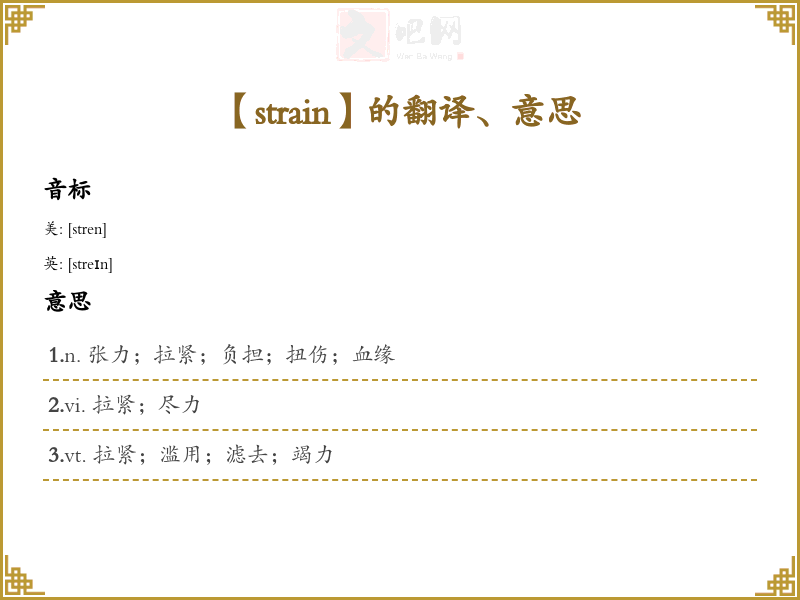【strain】的翻译、意思
时间: 2025-04-24 02:50:42
【strain】怎么读
美:[stren]
英:[streɪn]
【strain】是什么意思、字义解释
1. n. 张力;拉紧;负担;扭伤;血缘
2. vi. 拉紧;尽力
3. vt. 拉紧;滥用;滤去;竭力
4. n. (Strain)人名;(英)斯特兰
5. n. (植物、动物的)品种;种类
【strain】的详细解释
英文单词学*与分析:[strain]
1. 基本定义:
- 字面意思:Strain 字面上可以理解为“拉紧、拉伤”,在生物学中指的是某种特定的细菌或病毒类型。
- 定义:
- 名词:一种压力或紧张状态,通常指生理或心理上的负担。
- 动词:施加压力或拉紧某物,或因过度使用而导致损伤。
2. 词源与起源:
-
词源分析:Strain 源于古法语“estrain”,意为“拉紧”。其词根“strain”来自拉丁语“stringere”,意为“拉紧、绑紧”。
-
历史背景:该词的首次使用可以追溯到14世纪,主要用于描述物体的紧张状态。
-
课本:在**的教材中,可能出现在中学英语或高中的生物教材中;在牛津和美国的教材中,常见于初中及高中英语和科学课程。
3. 使用场景:
-
正式与非正式语境:
- 正式:在科学、医学或法律文献中,通常用来描述压力、损伤或特定的菌株。
- 非正式:日常交流中,常用于形容压力或疲惫的状态。
例证:
- “The strain of work has taken a toll on his health.”(工作的压力对他的健康造成了影响。)
-
特殊场合:
- 科学:用于描述细菌或病毒的特定分类,如“COVID-19 strain”(COVID-19变种)。
- 法律:在法律文件中,可能用于描述心理或情绪上的压力。
4. 示例句子:
-
The strain of the heavy workload caused her to feel exhausted.
(繁重工作带来的压力让她感到疲惫。) -
He suffered a muscle strain while lifting weights at the gym.
(他在健身房举重时拉伤了肌肉。) -
The scientist discovered a new strain of bacteria resistant to antibiotics.
(科学家发现了一种对抗生素有抵抗力的新细菌株。) -
Emotional strain can lead to serious health problems if not managed properly.
(情绪压力如果没有妥善管理,可能导致严重的健康问题。) -
The strain of the pandemic has affected mental health worldwide.
(疫情带来的压力影响了全球的心理健康。)
5. 同义词与反义词:
-
同义词:
- Pressure:通常指施加的力量或精神上的负担,但“strain”更强调拉紧或损伤的感觉。
- Stress:通常与心理负担相关,但“strain”在生理方面的应用更为普遍。
-
反义词:
- Relief:指减轻压力或负担,正好与“strain”相反。
- Ease:指轻松或舒缓状态,与“strain”的紧张状态形成对比。
. 学方法教学:
- 音标记忆法:Strain的发音为 /streɪn/,可以通过重复发音和听音结合来加深记忆。
- 词根记忆法:记住“strain”来自拉丁语“stringere”,联想“拉紧”的动作,帮助理解其意义。
7. 关联词汇:
- Tension:紧张
- Stress:压力
- Injury:伤害
- Load:负担
- Condition:状态
通过以上的学*与分析,可以更全面地理解“strain”这个单词的含义、用法及相关联想。
【strain】例句
1、[N-VAR] If strain is put on an organization or system, it has to do more than it is able to do. 压力
-
例:The prison service is already under considerable strain.监狱系统已受到很大的压力。
2、[V-T] To strain something means to make it do more than it is able to do. 使受到压力
-
例:The volume of scheduled flights is straining the air traffic control system.定期航班的数量使空中交通控制系统受到压力。
3、[[also N in pl]] Strain is a state of worry and tension caused by a difficult situation. 压力
-
例:She was tired and under great strain.她疲倦且处于巨大的压力之下。
4、[N-SING] If you say that a situation is a strain, you mean that it makes you worried and tense. 负担
-
例:I sometimes find it a strain to be responsible for the mortgage.我有时发现偿还抵押借款是个负担。
5、[N-UNCOUNT] Strain is a force that pushes, pulls, or stretches something in a way that may damage it. 压力
-
例:Place your hands under your buttocks to take some of the strain off your back.把双手放在臀部下面,以减轻一些背部压力。
6、[N-VAR] Strain is an injury to a muscle in your body, caused by using the muscle too much or twisting it. 损伤; 扭伤
-
例:Avoid muscle strain by warming up with slow jogging.通过慢跑热身避免肌肉损伤。
7、[V-T] If you strain a muscle, you injure it by using it too much or twisting it. 损伤; 扭伤
-
例:He strained his back during a practice session.他在一次练习课上扭伤了背部。
8、[V-T] If you strain to do something, you make a great effort to do it when it is difficult to do. 努力做
-
例:I had to strain to hear.我不得不努力地听。
9、[V-T] When you strain food, you separate the liquid part of it from the solid parts. 过滤
-
例:Strain the stock and put it back into the pan.滤出原汤,然后把它放回平底锅。
10、[N-COUNT] A strain of a germ, plant, or other organism is a particular type of it. 类型; 品种
-
例:Every year new strains of influenza develop.每年都有新的流感类型出现。
